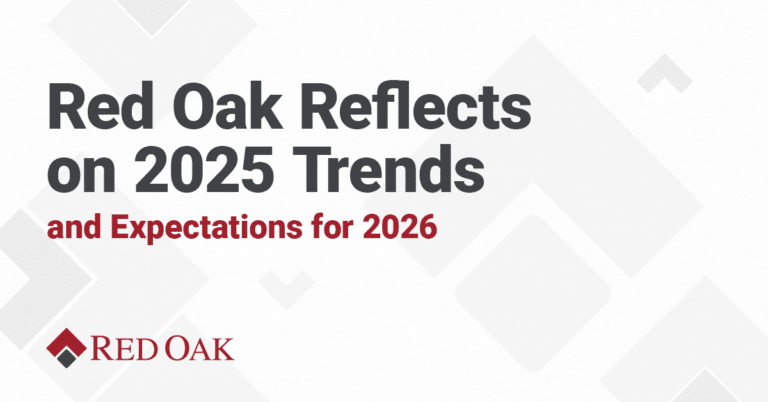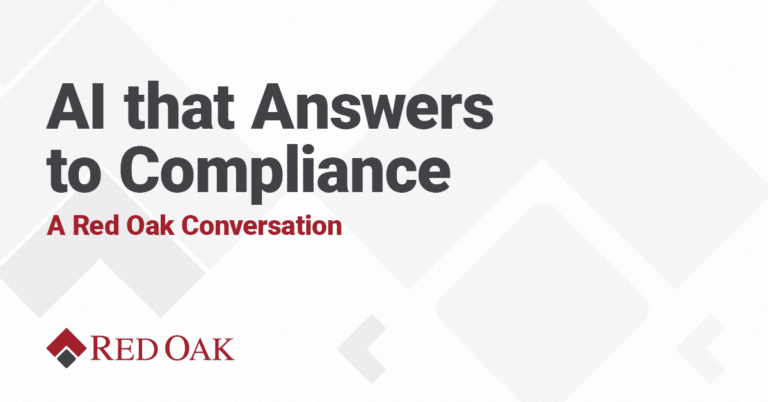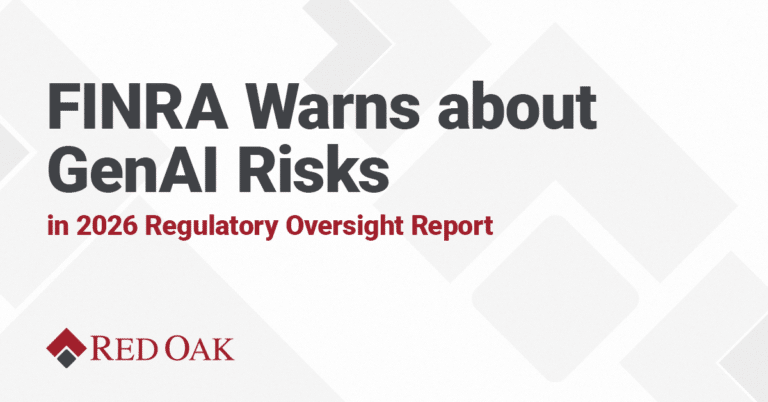Overview
Summary
The source provides an in-depth analysis of two new Financial Industry Regulatory Authority (FINRA) rules that significantly alter how firms supervise remote personnel and locations. FINRA Rule 3110.19 establishes criteria for designating a private residence as a Residential Supervisory Location (RSL), allowing supervisory activities to occur there under specific conditions designed to maintain investor protection. Simultaneously, FINRA Rule 3110.18 initiates a three-year Remote Inspections Pilot Program, offering an alternative to traditional, in-person inspections for certain office locations based on risk assessments. The article outlines the opportunities and challenges these rules present, such as cost efficiency versus the need for technological investments, and offers a roadmap for firms to achieve compliance, including updating written supervisory procedures and conducting risk assessments.
Critical Questions Powered by Red Oak
Transcript (for the Robots)
New rules from the Financial Industry Regulatory Authority (FINRA) introducing pivotal changes that reshape how firms supervise and inspect remote locations. Two major developments—FINRA Rule 3110.19, governing Residential Supervisory Locations (RSLs), and FINRA Rule 3110.18, initiating a Remote Inspections Pilot Program—present both opportunities and challenges for firms. These updates reflect FINRA’s efforts to modernize regulatory frameworks while preserving investor protection.
This article explores these changes in depth, their implications, and actionable strategies for firms to ensure compliance.
What is FINRA Rule 3110.19?
Effective June 1, 2024, FINRA Rule 3110.19 introduces the concept of Residential Supervisory Locations (RSLs), allowing firms to designate certain associated persons’ private residences as non-branch offices where supervisory activities occur. This designation provides flexibility in adapting to modern work arrangements but imposes conditions to ensure compliance and supervision standards are maintained.
Conditions for RSL Designation
To qualify as an RSL, a location must meet the following criteria:
- Exclusive Use: Only one associated person, or multiple individuals from the same immediate family, may conduct business from the residence.
- Non-Public Office: The residence cannot be presented as an office to the public, and no client meetings are allowed at the location.
- Prohibition on Handling Assets: The location must not handle customer funds or securities.
- Branch Office Association: The associated person must be assigned to a specific branch office, which should be disclosed on their business communications and materials.
- Supervised Communications: All correspondence and public communications must comply with FINRA’s supervisory and recordkeeping standards.
- Use of Firm Systems: The residence must rely on the firm’s technology for electronic communications to ensure compliance and record retention.
- Surveillance and Technology Requirements: Firms must implement technology and surveillance tools tailored to mitigate the risks associated with each RSL.
These criteria aim to create a balanced environment where flexibility in supervisory roles does not compromise oversight and investor protection.
What is FINRA Rule 3110.18?
FINRA Rule 3110.18, effective July 1, 2024, establishes a Remote Inspections Pilot Program, providing an alternative to traditional in-person inspections for certain branch and non-branch locations. This three-year program reflects FINRA’s recognition of evolving workplace dynamics and the increased feasibility of remote oversight due to advancements in technology.
Eligibility and Participation
Key aspects of the program include:
- Risk-Based Determination: Firms must evaluate the risk profiles of locations to determine their eligibility for remote inspection.
- Documentation Requirements: Written supervisory plans must outline the firm’s rationale for choosing remote inspections and detail the methodologies employed.
- Regulatory Reporting: Participating firms are required to report specific data to FINRA, allowing the regulator to monitor the program’s effectiveness and address any emerging risks.
The pilot program is a response to the industry’s shift towards remote work and aims to enable firms to adapt their compliance practices while maintaining rigorous supervisory standards.
How Does It Impact My Firm?
The introduction of these rules signifies a profound shift in supervisory practices. Firms now have more flexibility in supervising remote employees and conducting inspections, but this comes with increased regulatory scrutiny and operational complexity.
Opportunities
1. Cost Efficiency: The ability to designate RSLs and conduct remote inspections may reduce overhead costs associated with maintaining physical offices and travel.
2. Adaptability: These rules allow firms to accommodate remote work preferences while maintaining compliance standards.
3. Operational Modernization: Firms can leverage technology to streamline supervisory and inspection processes, aligning with modern business practices.
Challenges
1. Enhanced Supervisory Procedures: Firms must update their written supervisory procedures to address the specific risks and requirements of RSLs and remote inspections.
2. Technological Investments: Ensuring robust cybersecurity, communication, and surveillance systems are critical to supporting these initiatives.
3. Regulatory Scrutiny: Firms opting into these programs must prepare for heightened oversight from FINRA, necessitating meticulous adherence to the rules.
4. MAP filing: considerations should be given to whether an increase in remote office locations constitutes a material change of business operations requiring FINRA approval under MAP rules or to seek guidance through FINRA’s materiality consultation process.
What is FINRA Saying?
FINRA has emphasized that these rules are designed to support the industry’s transition toward a more flexible supervisory framework. By allowing RSLs and introducing remote inspections, FINRA acknowledges the necessity of evolving alongside technological and workplace advancements.
However, FINRA has made it clear that this flexibility does not equate to a reduction in oversight.
Firms are expected to:
- Implement rigorous supervisory controls.
- Ensure that remote supervisory activities and inspections meet the same standards as traditional methods.
- Maintain open communication with FINRA to address compliance challenges proactively.
What Does This All Mean?
For firms, these changes reflect a broader trend in regulatory modernization. FINRA is recognizing the realities of remote work while emphasizing the need to uphold investor protection. This evolution requires firms to rethink traditional compliance models and embrace innovation in supervisory practices.
At its core, these rules aim to strike a balance between flexibility and accountability. Firms that adapt effectively can gain operational efficiencies while maintaining high compliance standards.
What Does My Firm Need to Do?
Adapting to these regulatory changes requires deliberate action and strategic planning. Here’s a roadmap to help firms navigate these updates:
1. Conduct Risk Assessments
Evaluate the risk profiles of associated persons and locations to determine their suitability for RSL designation or inclusion in the Remote Inspections Pilot Program. Document these assessments to demonstrate compliance with FINRA’s requirements.
2. Update Supervisory Procedures
Revise written supervisory procedures to reflect the specific conditions and safeguards associated with RSLs and remote inspections. Ensure these updates address recordkeeping, communication oversight, and technological requirements.
3. Train and Educate Personnel
Provide comprehensive training for associated persons on the new rules and updated compliance procedures. This ensures that employees understand their roles and responsibilities within the new framework.
4. Determine MAP requirements
Calculate whether this will cause the firm to go over their Safe Harbor allotment of office locations. Firms may need to file an amendment to their membership agreement. Firms also have the option to request guidance through FINRA’s materiality consultation process.
5. Engage with FINRA
Maintain an open dialogue with FINRA to seek guidance, address compliance questions, and demonstrate your firm’s proactive approach to adhering to the new regulations.
How Can Red Oak Help?
Navigating the complexities of FINRA Rules 3110.19 and 3110.18 requires a partner with deep regulatory expertise and a tailored approach. With over 120 years of combined industry experience, Red Oak’s Consulting team stands ready to guide your firm through these transformative changes with confidence and precision.
Red Oak’s Consultants Expertise Includes:
- Risk Audits: Identifying and addressing current risks associated with Residential Supervisory Locations (RSLs).
- Policy and Procedure Updates: Crafting and implementing a comprehensive, reasonably designed compliance program for RSLs and remote inspections.
- Team Training: Delivering thorough training to ensure your staff understands and complies with the new requirements.
- Regulatory Support: Answering your questions and providing actionable guidance on the nuances of FINRA’s latest rules.
Red Oak’s solutions are designed to meet the unique needs of your firm, ensuring you stay ahead of compliance challenges while maintaining operational efficiency.



